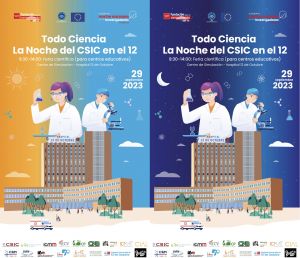“Los y las participantes disfrutarán toda la mañana de talleres científicos impartidos por especialistas y de una yincana en torno a las mujeres galardonadas con el Nobel, la Medalla Fields y el Premio Abel”, explica Silvia Gallego, investigadora del Instituto de Ciencia de Materiales de Madrid (ICMM), CSIC, y coordinadora del proyecto.
Será por la tarde cuando el público general podrá acercarse, también previa reserva totalmente gratuita, al espacio para disfrutar de los talleres científicos que estos once centros (10 CSIC + 12 de octubre) ofrecerán. ¿Alguna vez te has preguntado qué papel juegan el gusto y el olfato cuando disfrutamos de los alimentos? ¿Sabes lo que es el vacío? ¿A qué te suena la catálisis? ¿Cómo se hace biotecnología con las plantas? ¿Puede verse el sonido? ¿Qué es eso de nanociencia? Todo esto, y mucho más, se responderá en divertidos e interactivos talleres para todas las edades que cuentan con expertos y expertas en divulgación científica como maestros de ceremonia.
Por supuesto, el propio hospital tendrá un espacio destacado, en el que se irán haciendo diferentes demostraciones de la ciencia que se estudia y se hace en un centro sanitario, más allá de curar enfermedades. "Esta es una gran oportunidad, ya que tendremos en un mismo espacio ciencias muy diversas, por lo que quien se acerque a nuestro evento se irá con un conocimiento muy amplio sobre qué se investiga en nuestro país", continúa Gallego. La investigadora destaca, además, que celebrar la 'Researchers Night' en el 12 de Octubre permitirá hacer el evento más inclusivo, llegando a público con dificultades para transportarse por estar en un centro sanitario.
'Todo ciencia. La Noche del CSIC en 12' concluirá con un concierto en directo: la banda Schizzofunk, que se autodefine como banda de funk, rock y rejolguete de Madrid, tocará temas propios durante 1hora y cuarto, aproximadamente, al final de la jornada. Son batería, bajo, dos guitarras y un saxo, avanza Miguel Camblor, investigador en el ICMM y uno de los integrantes del grupo. Todo esto hace de la oferta del evento de este año uno de los más potentes en la 'Researchers Night' en Madrid.
Tras haber colgado el cartel de ‘sold out’ en años anteriores, la organización abrirá la posibilidad de reservar previamente todas las actividades, para que nadie se quede sin sitio. Esto podrá realizarse a través de la web del evento a partir del 11 de septiembre a las 9 de la mañana. Igualmente, se permitirá el acceso sin reserva siempre que el aforo lo permita.
Los centros que organizan esta actividad son el Instituto de Ciencia de Materiales de Madrid (ICMM), el Instituto de Cerámica y Vidrio (ICV), el Instituto de Catálisis y Petroleoquímica (ICP), el Centro Nacional de Biotecnología (CNB), el Centro de Biología Molecular "Severo Ochoa" (CBM-SO), el Instituto de Ciencias de la Alimentación (CIAL), el Instituto de Física Teórica (IFT), el Instituto de Ciencias Matemáticas (ICMAT), el Instituto de Nano y Microelectrónica (IMN) y el Instituto de Investigaciones Biomédicas "Alberto Sols" junto al Hospital 12 de Octubre.
MADRIDNIGHT es un proyecto de divulgación científica, coordinado por la Fundación madri+d y financiado por la Unión Europea dentro del Programa Horizonte Europa, bajo las acciones Marie Skłodowska Curie, con el acuerdo de subvención no 101061343.
Información práctica
Título de la actividad: 'Ciencia en el Doce. La Noche del CSIC'
Lugar de celebración: Hospital 12 de Octubre
Horario: Mañana (centros educativos) y tarde (público general)
Para más información, pincha aquí






